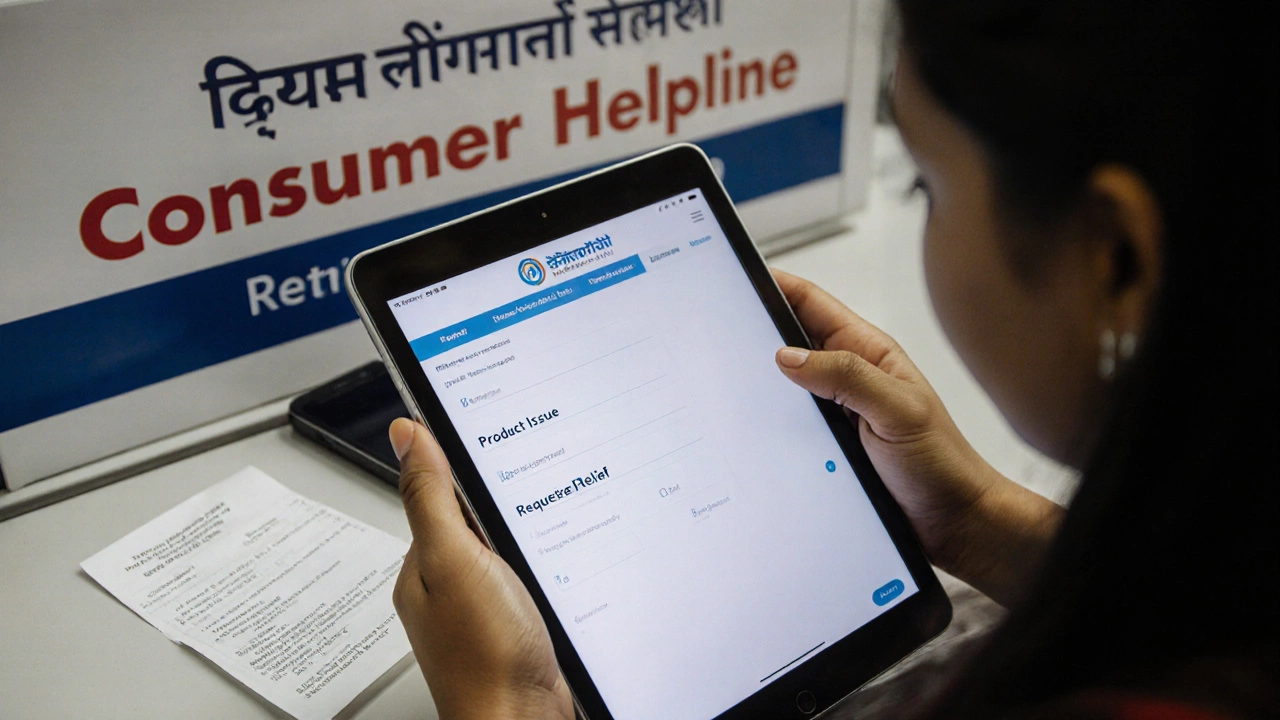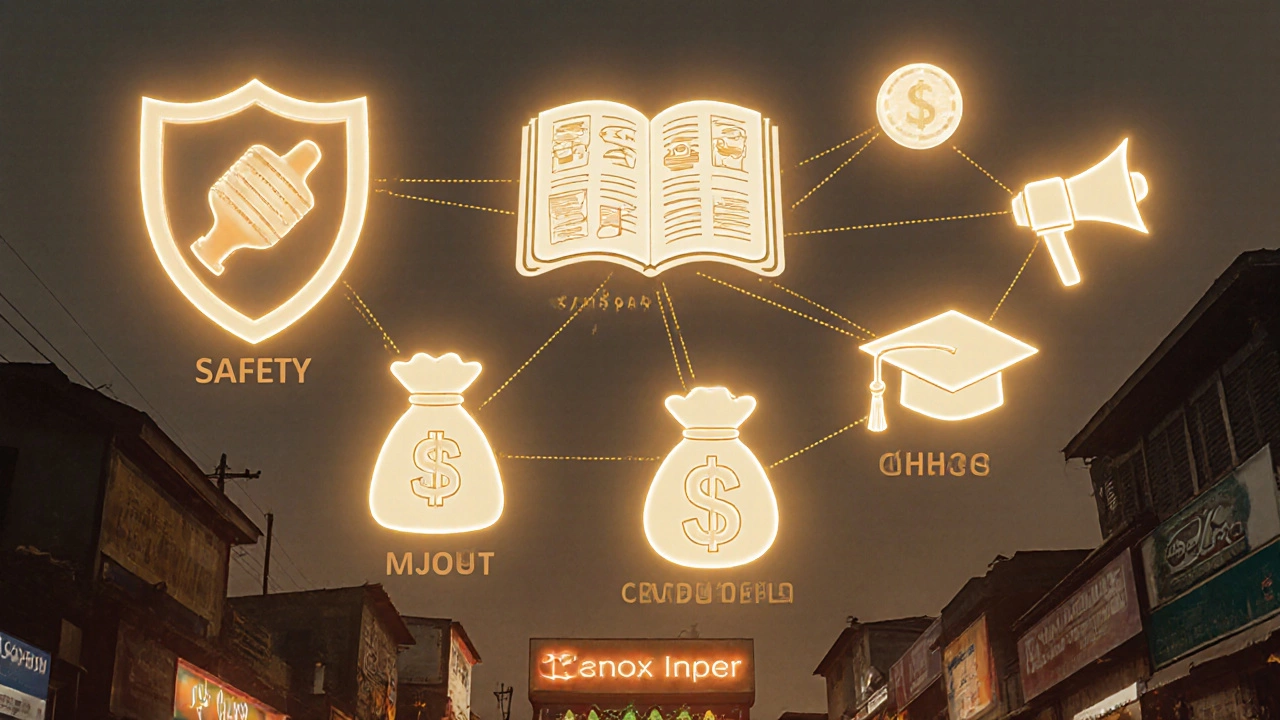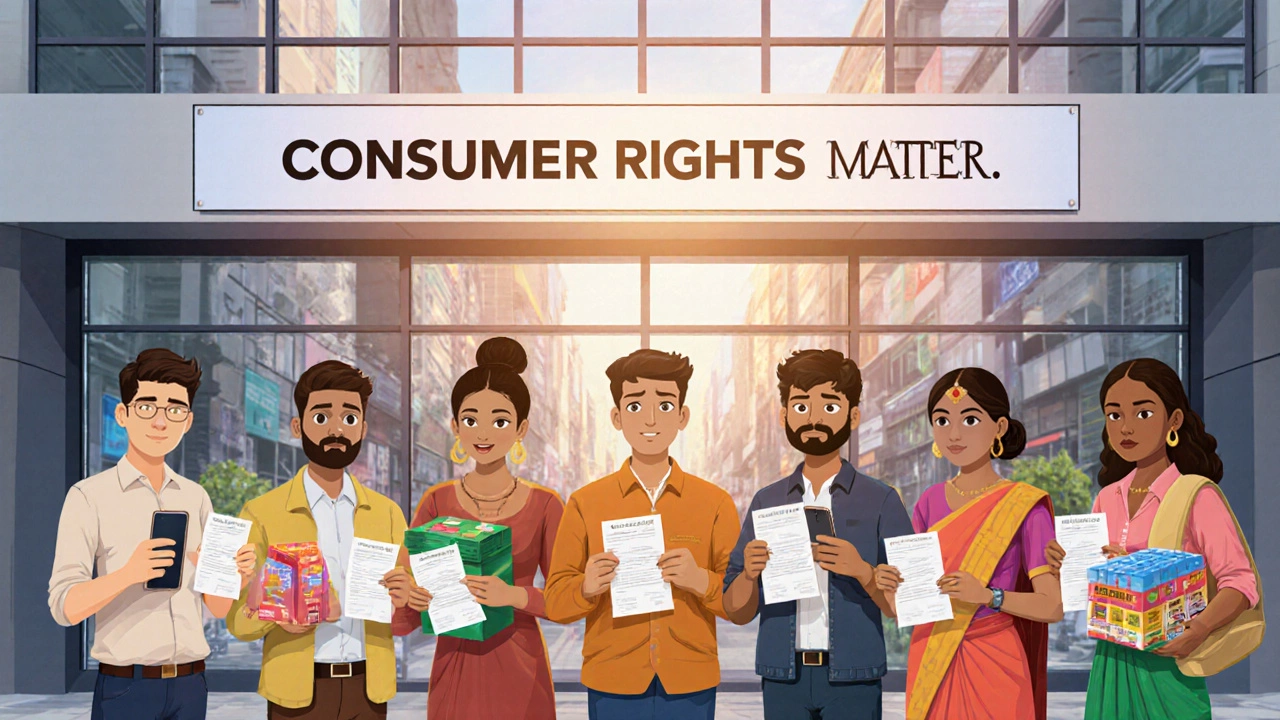Consumer Complaint Eligibility Checker
Check Your Eligibility
This tool helps you determine if you qualify to file a complaint under India's Consumer Protection Act 2019.
Results
Results will appear here after checking eligibility.
If you’ve ever bought a faulty phone, been overcharged at a restaurant, or received a service you never agreed to, you’re not alone. In India, millions of consumers face these issues every year. The Consumer Protection Act in India is the law that gives you power to fight back - no lawyer needed. It’s not some distant legal theory. It’s a real tool you can use today to get refunds, replacements, or compensation.
What the Consumer Protection Act Actually Does
The Consumer Protection Act, passed in 2019 and effective from July 2020, replaced the older 1986 version. It’s designed to protect people who buy goods or use services - not businesses, not corporations, but regular consumers. The law says if you pay money for something and it’s defective, misleading, or unsafe, you have rights. These aren’t suggestions. They’re enforceable under the law.
Before this law, consumers had to go through slow, expensive court systems. Now, there’s a dedicated structure just for you. The Act created consumer commissions at district, state, and national levels. These aren’t regular courts. They’re faster, simpler, and you can file a complaint yourself without hiring a lawyer.
Who Counts as a Consumer Under This Law?
You’re a consumer if you buy something for personal use - not for resale or commercial purposes. That includes:
- Buying groceries, clothes, electronics, or furniture
- Booking a flight, hotel, or cab service
- Getting medical treatment, education, or insurance
- Subscribing to a streaming service or mobile plan
Even if you didn’t pay directly - say, your employer bought a laptop for you - you’re still protected if you’re the one using it. But if you bought a machine to resell, or you’re a business owner buying supplies for your shop, this law doesn’t cover you.
Your Six Basic Consumer Rights
The Act guarantees six clear rights. You don’t need to memorize them, but knowing them helps you speak up:
- Right to Safety - Products shouldn’t harm you. This covers everything from unsafe toys to contaminated food.
- Right to Be Informed - Companies must give you clear facts: ingredients, price, expiry, warranty, and terms. No hidden clauses.
- Right to Choose - You shouldn’t be forced into one brand or service. Monopolies and unfair bundling are illegal.
- Right to Be Heard - If you complain, someone must listen. Companies must have grievance cells, and commissions must take your case seriously.
- Right to Seek Redressal - If you’re cheated, you can get your money back, a replacement, or compensation for loss or injury.
- Right to Consumer Education - You have the right to learn about your rights. Government agencies must spread awareness.
These aren’t vague ideals. Courts have awarded compensation for things like food poisoning from packaged snacks, fake weight loss pills, and hidden charges on airline tickets.

How to File a Complaint
Filing a complaint is easier than you think. You don’t need a lawyer. Here’s how:
- Try to resolve it first - Contact the company’s customer service. Keep a record of your call, email, or chat.
- Write a formal complaint - If they don’t fix it, send a letter or email clearly stating what happened, what you want (refund, replacement, etc.), and how long you’ve waited.
- File online - Go to the National Consumer Helpline portal (consumerhelpline.gov.in). Fill out the form with details of the product, seller, and your request. Upload receipts, photos, or messages as proof.
- Wait for notice - The seller gets 30 days to respond. If they ignore it or say no, your case moves to the consumer commission.
- Attend the hearing - You’ll get a date. Show up with your documents. You can bring a friend for support. No need for fancy clothes or legal jargon.
Complaints are free to file. There’s no court fee for claims under ₹5 lakh. Even for larger claims, fees are low compared to regular courts.
What Kind of Relief Can You Get?
Consumer commissions can order several outcomes:
- Refund of the full price you paid
- Replacement of the defective product
- Removal of defects or deficiencies in service
- Compensation for mental agony, physical injury, or financial loss
- Discontinuation of unfair trade practices
- Payment of litigation costs
For example, in 2023, a consumer in Pune got ₹1.2 lakh in compensation after a hospital misdiagnosed her condition, leading to unnecessary surgery. In another case, a family in Delhi received a full refund plus ₹50,000 for a fake organic baby food that made their child sick.
What’s Not Covered?
The law has limits. You can’t use it for:
- Services provided for free
- Goods or services bought for resale or commercial use
- Disputes over land, property, or inheritance
- Issues between two businesses (B2B contracts)
- Problems with digital content you downloaded (unless it’s a paid app with clear terms)
Also, you must file within two years of the problem happening. After that, you need to explain why you waited - and the commission decides if they’ll still hear you.

Why This Law Matters More Than Ever
India’s consumer market has exploded. Online shopping, subscription services, fintech apps, and e-commerce giants are everywhere. But scams have grown too - fake reviews, hidden subscriptions, fake warranties, and misleading ads.
The 2019 Act added new protections for the digital age:
- Product liability - If a defective product hurts you, the manufacturer, seller, or even the ad agency can be held responsible.
- Class action suits - If thousands of people are cheated by the same company (like a telecom provider overcharging), one group can file a joint complaint.
- Online dispute resolution - Many cases are now settled through video hearings, reducing travel and time.
- Mediation cells - Before a hearing, you can opt for free mediation. Over 60% of cases are settled this way.
These changes mean you’re not just a customer - you’re a protected participant in the economy.
Real Stories, Real Results
In 2024, a student in Bengaluru bought a ₹25,000 laptop online. It stopped working after 12 days. The seller refused to repair or replace it, saying the warranty was void because the box was opened. The student filed a complaint. The commission ruled that opening the box to check the device doesn’t void warranty. She got a full refund plus ₹15,000 for mental stress and wasted time.
Another case: a couple in Hyderabad booked a wedding hall. The venue canceled two weeks before the event. No refund. They filed a complaint. The commission ordered the company to return ₹3 lakh plus ₹50,000 for emotional distress and extra costs of rebooking.
These aren’t rare. They happen every day.
What to Do If You’re Challenged
Some companies still try to scare you. They might say, “You can’t sue us,” or “This is our policy.” Don’t believe them. The Consumer Protection Act overrides any private terms.
Keep these tips handy:
- Always keep your bill, receipt, or invoice - even a screenshot of a payment confirmation works.
- Save all communication: emails, WhatsApp messages, call logs.
- Don’t sign anything that says “no refund” unless you fully understand it - such clauses are often illegal.
- Use the National Consumer Helpline number: 1915. It’s free, available 24/7, and you can call in any language.
You don’t need to be rich or educated to use this law. You just need to know it exists - and that you’re not alone.
Is the Consumer Protection Act only for physical products?
No. The law covers both physical goods and services - including digital services like streaming subscriptions, online education, banking apps, and mobile plans. If you paid for a service and didn’t get what was promised, you can file a complaint.
Can I file a complaint against a foreign company?
Yes, if the company sells to Indian consumers. For example, if you bought something from Amazon US, Flipkart, or a website based abroad, and you paid in Indian rupees, you can file a complaint in India. The law applies to any seller targeting Indian customers.
Do I need a lawyer to file a complaint?
No. You can file the complaint yourself using the online portal or by submitting a written application. Many people win their cases without legal help. The commissions are designed to be consumer-friendly, not lawyer-friendly.
How long does it take to get a decision?
Most cases are resolved within 3 to 6 months. If the seller agrees to settle early, it can be done in weeks. Mediation often speeds things up. The law requires commissions to dispose of cases within 90 days of receiving the notice - though delays happen, they’re becoming rarer.
What if the company ignores the commission’s order?
If a company refuses to follow the order, you can ask the commission to enforce it. They can issue a warrant, freeze bank accounts, or even impose fines. In extreme cases, the company’s directors can be held personally liable. Enforcement is stronger now than ever before.
If you’ve been treated unfairly, don’t stay silent. The Consumer Protection Act in India is your shield. Use it. It’s there for you - not for lawyers, not for corporations, but for the person who just wants to buy something and get what they paid for.
